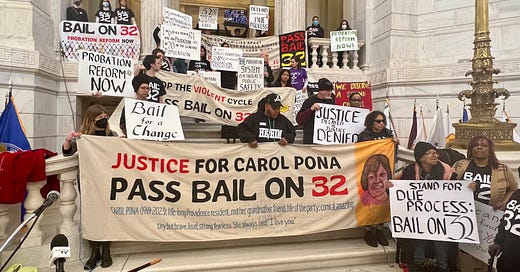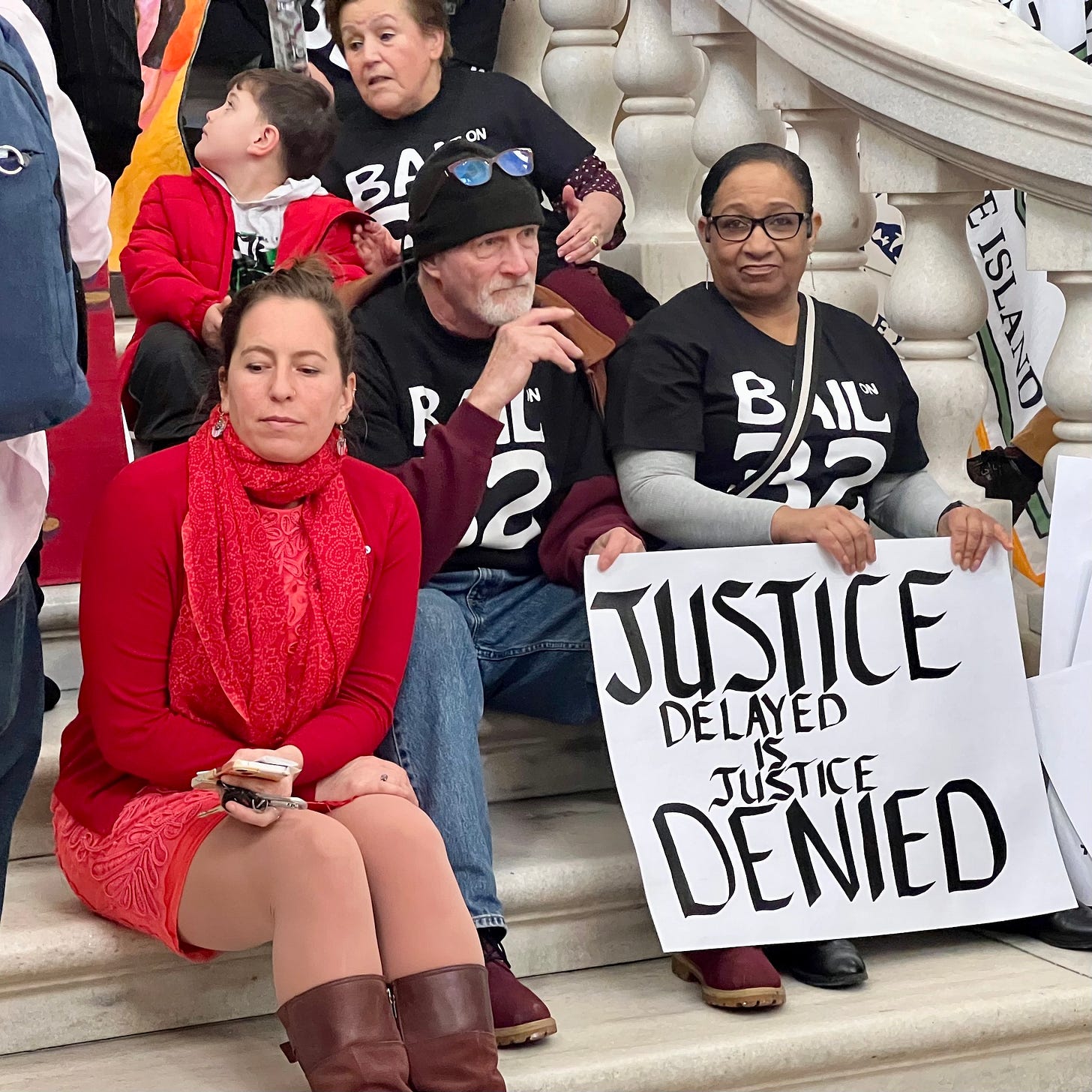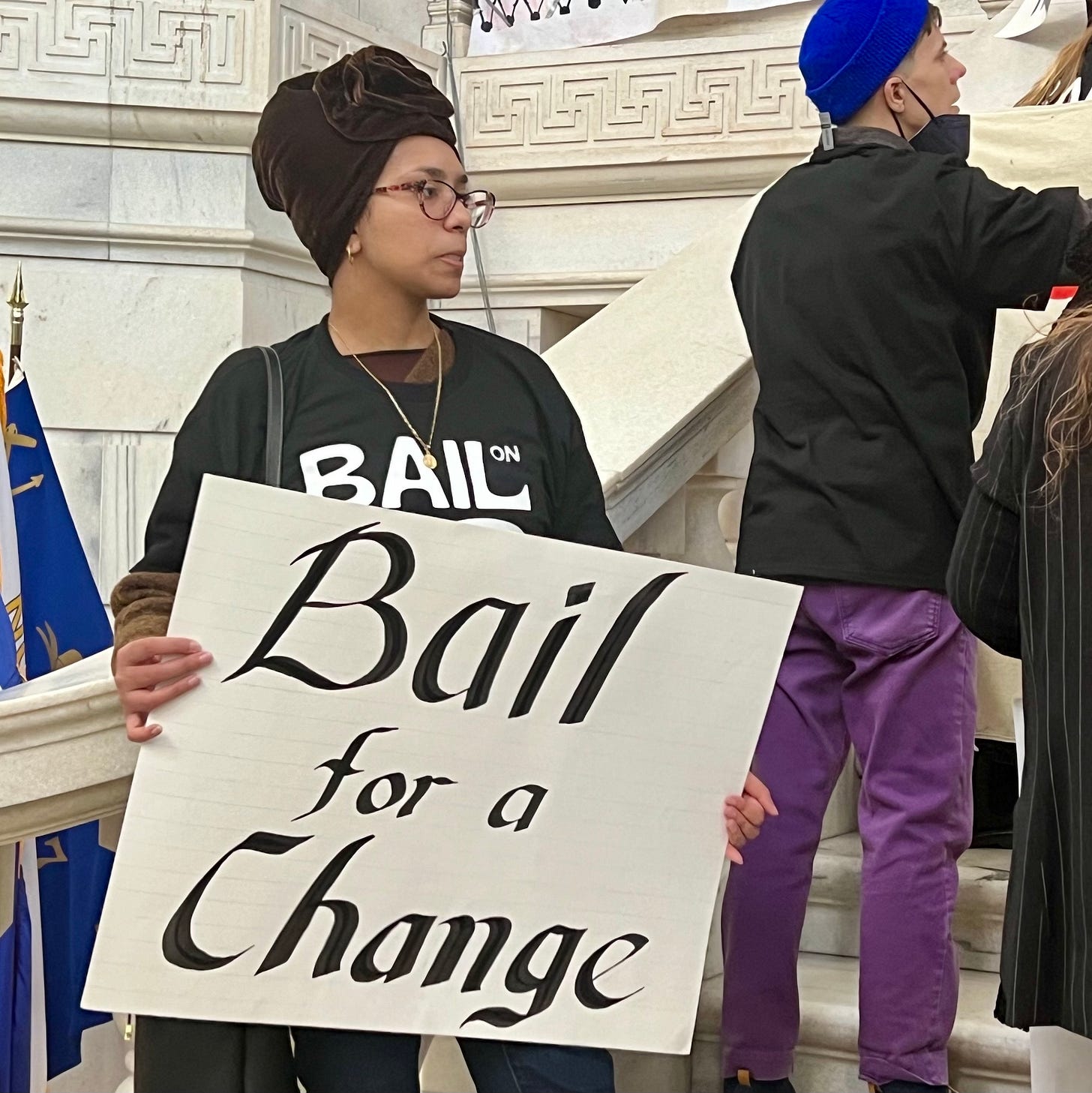Bail on 32: Advocates call on the General Assembly to reform bail in Rhode Island
Rhode Island has the second-highest rate of people on probation in the nation, behind only Georgia, and nearly double the national average...
Community members gathered at the Rhode Island State House rotunda on Thursday to spread awareness of the Bail on 32 campaign, led by Direct Action for Rights and Equality (DARE) a local social justice organization in Providence. The rally featured speakers affected by probation and incarceration in Rhode Island. The rally supported changing a law that results in, on average, 85% of those accused of probation violation being denied bail at their initial presentments.
You can watch the video here:
Senator Meghan Kallman (Democrat, District 15, Pawtucket) and Representative Jose Batista (Democrat, District 12, Providence) are reintroducing legislation they introduced last year (2023-H 5571, 2023-S 0411) to reform a law that currently allows anyone arrested for an alleged probation violation to be held without bail for up to 10 days, not counting weekend and holidays, awaiting a hearing on the violation. Although the statute provides judges the discretion to grant bail, in 2022, bail was denied to 85% of those Rhode Islanders accused of violating the terms of their probation.
“If we are truly committed to the success of all Rhode Island communities and families, we must end mass incarceration,” said Senator Kallman. “The very system that is supposed to ensure the safety of society is exactly what is causing unemployment, poverty, homelessness, and family instability for thousands of Rhode Islanders every year. Our state needs to lift its heavy-handed approach to incarceration, probation, and bail because it’s making it prohibitively difficult for individuals who have been involved with the justice system to succeed at maintaining a stable life for themselves and their families.”
“It is self-defeating for a system that purports to be rehabilitative to routinely lock people up without due process long enough for them to lose their jobs, their homes, and even their children,” said Representative Batista. “Reforming bail for alleged probation violations is one important step toward reducing Rhode Island’s destructively high incarceration rate and ending a hopeless cycle that perpetuates poverty and all of its associated problems.”
Bail on 32
In the state of Rhode Island, individuals arrested for alleged probation violations are jailed, without bail regardless of innocence or guilt. Arbitrarily applied offenses, such as “failing to keep the peace,” can result in people on probation being automatically reincarcerated from two weeks to months before a violation hearing (termed a “32F violation”). The courts incarcerated 85% of alleged violators without hearing in 2022, putting their jobs, housing, families, and health at risk. In response, DARE is relaunching its Bail on 32 campaign. This legislation that would mandate the courts levy reasonable bail on accused probation violators. Bail on 32 states that the courts shall grant bail on all probation violations pending a violation hearing.
By threatening people on probation with incarceration and no real opportunity to contest new charges or the violation, the courts coerce individuals into plea deals and extended sentences. Rhode Island has the second-highest probation rate and the third-longest average sentence in the country; coupled with our violation process, this means that Rhode Islanders are constantly ensnared in the prison system. Our recidivism rate - the fifth highest nationwide - reflects this. The system’s impact falls hardest on Rhode Island’s Black communities, with Black men representing 1 in 20 of the state’s population but 1 in 6 of those on probation. For communities already targeted by poverty and racialized policing, our system strips away the little accountability we can access within the court system. This bill will enact radical change in Rhode Island, restoring due process rights to 18,000 Rhode Islanders and reducing the population by hundreds at the seven prison facilities of the Adult Correctional Institutions (ACI).
The proposed legislation would establish a presumption of release for those accused of probation violations while they await a hearing, and allow a judge to require reasonable bail only if necessary to ensure the defendant’s appearance in court.
“People deserve due process. You are not supposed to be guilty until proven innocent,” said Melonie Perez, staff organizer of the Behind the Walls Committee at Direct Action for Rights and Equality (DARE), which is leading a broad coalition of more than 30 community advocacy groups supporting the bill.1
DARE’s Behind the Walls (BTW) committee is leading the charge to change probation violation rulings in the state. BTW - led by justice-impacted members - wrote, introduced, and is building momentum around historic legislation to mandate bail for probationers accused of a 32F violation. Passing Bail on 32 before the Rhode Island General Assembly means the new legislation would require the court to set reasonable bail for all those individuals who appear before it as probation violators. Currently, those accused of violating their probation are said to be incarcerated for up to ten days, but in reality, they can be held without a hearing for an unlimited amount of time. The Bail on 32 bill, says supporters, “would require the courts to grant bail or personal recognizance to those accused of violations so that they can fight new charges and violations from within their communities instead of behind bars.”
DARE writes:
Last year, judges denied bail to 85% of people accused of a probation violation under 32F. Under the current RI law, people like Carol Pona who are accused of a probation violation (whether for a technical violation of their terms, a new charge, or “failure to keep the peace”) may be held without bail for up to 10 business days while they await a violation hearing. In practice, this period of incarceration often stretches on for months before the person has the chance to defend themselves in court. Ms. Pona’s death highlights what the protesters say is the cruel impact of denying due process to people on probation.
Bail on 32 would require that judges assign bail to people accused of probation violation. This would allow people in situations like Ms. Pona’s the chance to go back home until they can defend themselves in court. It would protect a judge’s discretion to set bail as they see fit and not restrict their ability to hold someone without bail on any new charge.
“For decades Rhode Island’s probation system has violated our rights and destroyed our communities,” said Joe Benton, an organizer at DARE. “Bail on 32 is a straightforward step toward a more just system. It will save families and it will save lives.”
Speakers included Vincent Lucas, who is on probation and now works as a peer recovery specialist, who talked about how he’s afraid to give a ride to the people he helps because if one of them has illicit drugs on them, they could ends up at the ACI
“It makes me vulnerable of losing everything I’ve worked hard for and makes me vulnerable for not being able to help others,” said Brandon Robinson, who is a community organizer and lobbyist for OpenDoors and is also on probation, spoke about how the current system jeopardizes the work he’s done to move his life, and the lives of others, forward.
Also speaking was Tiqua Pona, whose mother Carol Pona died while at the ACI on a 32F violation. “Had Bail on 32 been passed, my mother would be alive today. She would be, but she's not. I'm asking for it to be passed because the next individual, or their mother, brothers, sisters, or whoever - any normal human being shouldn't have to go through a 32 F.”
Also speaking were David Chavez and Whopy Goldstein.
Rhode Island has the second-highest rate of people on probation in the nation, behind only Georgia, and nearly double the national average. Individuals can face a probation violation for issues as minor and vague as “failing to keep the peace,” which can result in their reincarceration for offenses that, on their own, would not result in jail time. By threatening people on probation with incarceration and no real opportunity to contest new charges or the violation, the courts coerce individuals into plea deals and extended sentences.
According to DARE, a 2015 study found that in practice, people were held an average of 31 days while waiting for a violation hearing in Rhode Island, and alleged probation violators make up 37% of all pretrial admissions to the Adult Correctional Institutions (ACI).
Regardless of the outcome of their hearing, the time spent behind bars waiting for the hearing is long enough for people to lose their jobs, fall behind on bills and rent, get evicted, and lose custody of their children, even if they are eventually cleared of the violation. Many people take plea deals - which can include longer periods of probation - because they can’t afford those devastating consequences.
The system also exacerbates racial injustices: According to DARE, in 2022, 1 in 4 defendants in probation violation cases were Black, although Black Rhode Islanders represent only 1 in 14 in the general population. One in 6 Black men in Rhode Island is on probation at any given time. For communities already targeted by poverty and racialized policing, our system strips away the little accountability we can access within the court system. This bill will enact radical change in Rhode Island, restoring due process rights to 18,000 Rhode Islanders and reducing the population by hundreds at the seven prison facilities of the ACI.
Direct Action for Rights and Equality, ACLU RI, Alliance to Mobilize our Resistance (AMOR), Amos House, Black and Pink Providence, Center for Health and Justice Transformation, COYOTE RI, Economic Progress Institute, FANG Collective, George Wiley Center, Groundwork RI, Latino Policy Institute, Michael A. DiLauro, Esq., The Just Criminal Justice Group, New Urban Arts, OpenDoors RI, Project Weber/ RENEW, Reentry Campus Program, RI Association for Addiction Professionals, RI Center for Justice, RI Coalition to End Homelessness, RI Interfaith Coalition to Reduce Poverty, RI Poor People’s Campaign, RI State Council of Churches, RI Womxn’s Action Initiative, RI Working Families Party, Showing Up for Racial Justice RI, Sisters of Mercy of the Americas Justice Team, Stop Torture RI Coalition, Substance Use Policy Education and Recovery PAC, United Way of RI, VICTA, White Coats for Black Lives- Alpert Medical School Chapter.







The American Bar Associaition has a project to eliminate cash bail, the whole bail system ought to be eliminated